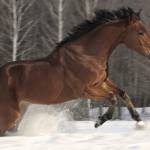Feeding to Avoid Colic in Cold Weather: Fact or Fiction

Except for old age, colic is responsible for more deaths in horses every year than any other condition. Colic, which refers to any abdominal pain, can be caused by twists, displacements, blockages, or other problems anywhere along the tortuous path of the gastrointestinal tract.
“There is some speculation that the incidence of colic increases in cold weather, when the humidity is low, when there is an abrupt change in weather, or when a snow storm occurs. So far, though, the science of colic has not confirmed the suspected association,” shares Kathleen Crandell, Ph.D., Kentucky Equine Research nutritionist.
Colic risk can be grouped into two main factorial categories: internal (age, breed, sex, pregnancy status) and external (feeding, management, environment). There is usually little horse owners can do about the internal factors, but there are several possible ways to manipulate external factors, including nutrition, to minimize the chances of cold-weather colic.
Preeminent colic researcher Nathaniel A. White II, D.V.M, M.S., from Marion DuPont Scott Equine Medical Center in Leesburg, Va., suggests the following:
- Mistakes in feeding and feeding management markedly increase the risk for colic.
- Any change in management due to the presence of snow can increase the chances of colic. For example, if horses are kept inside rather than being turned out and the horses’ diets are not altered even though they are not turned out or exercised, then colic can ensue.
- An increased incidence of impaction colic has been suggested in cold weather due to decreased water intake (e.g., the water source freezes).
- Offering warm water, not cold, might minimize colic in cold weather.
In sum, although horse owners cannot completely eliminate the risk of colic, ensure horses have access to water at all times and avoid abrupt changes in diet or exercise as best as possible, which can be challenging in ice or snow storms. If horses must be confined to their stalls due to inclement weather, consider decreasing the amount of concentrates offered.








